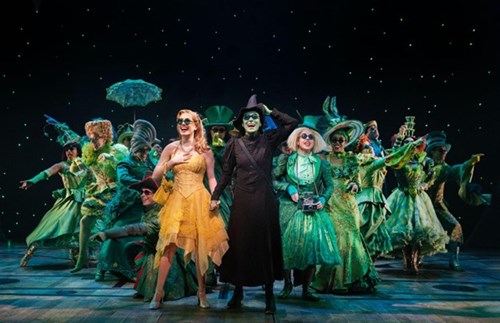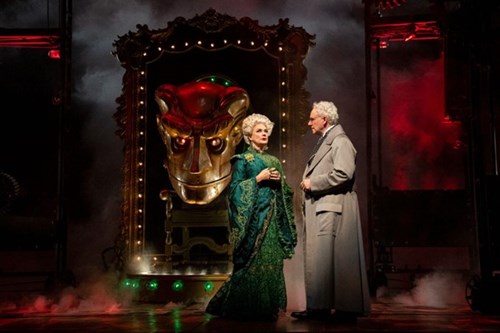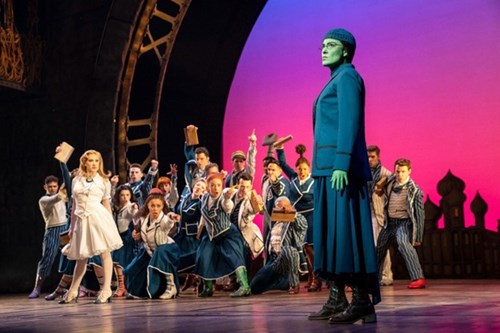
For the past two decades, the word “wicked” has been synonymous with one of the most successful and beloved Broadway musicals of all time. Based on the 1995 novel Wicked: The Life and Times of the Wicked Witch of the West by Gregory Maguire, the musical has made an indelible mark on Broadway, creating a legacy that continues to soar high above the rest.
Having recently celebrated its 20th anniversary, the importance and impact of Wicked in the theatre industry cannot be overstated. The show, with its iconic emerald-green logo, has become a staple of Broadway since its debut in 2003. It has not only transformed the way audiences view the familiar world of Oz but also shifted the paradigm of Broadway musicals. The 20th anniversary of Wicked is not just a celebration of the show's longevity, but also a testament to its enduring popularity and impact. This milestone serves as a compelling reminder of the musical's universal appeal, its groundbreaking narrative, and its role in shaping the Broadway landscape.
The source material for the Broadway sensation, Wicked: The Life and Times of the Wicked Witch of the West, was penned by Gregory Maguire. Released in 1995, the novel was a divergent take on L. Frank Baum's The Wonderful Wizard of Oz, providing a backstory for the green-skinned antagonist and transforming her into a misunderstood protagonist.
The novel's plot delves into the life and times of Elphaba, the wicked witch of the west, from her birth to her untimely demise. It paints a picture of a character who is not wicked by nature, but rather misunderstood by society. The novel explores themes of identity, morality, and the dichotomy of good and evil, presenting the readers with a more complex and layered Oz than they had ever known.
The novel's reception was overwhelmingly positive, with critics praising Maguire’s ability to turn a well-known tale on its head and offer a fresh perspective. Its success paved the way for its subsequent transformation into a Broadway phenomenon, extending the legacy of the 'Wicked Witch' in an entirely new direction.
The decision to adapt Maguire's novel into a musical came from composer and lyricist Stephen Schwartz, who was captivated by the novel's unique perspective and its rich, complex characters, and saw potential for a musical adaptation. The idea was to retain the narrative's essence while transforming it into a vibrant, emotionally charged Broadway spectacle.
To bring this vision to life, a creative team was assembled, featuring the talents of Winnie Holzman, writer for the acclaimed television series My So-Called Life, who would pen the book for the musical. Together, Schwartz and Holzman began the task of reshaping the novel's intricate plotlines and themes into a cohesive and engaging stage production.

The adaptation process required significant changes. Some characters were omitted or altered, and the narrative was streamlined to focus on the relationship between Elphaba and Glinda. The musical also incorporated a brighter tone, well-placed humor, and catchy, powerful songs, contrasting the novel's darker, more political undertones.
Before its Broadway debut, Wicked underwent a pre-Broadway tryout in San Francisco in the spring of 2003. This stage of development allowed the creative team to gauge audience reactions and make necessary alterations. Some songs were revised, and aspects of the plot were clarified, ensuring that the show was ready to defy gravity when it hit the Broadway stage later that year.
Wicked made its Broadway debut on October 30, 2003, at the Gershwin Theatre, with a stellar cast that included Idina Menzel as Elphaba and Kristin Chenoweth as Glinda. These two powerhouse performers breathed life into their respective characters, delivering performances that captured the hearts of audiences and critics alike.
The initial reception of Wicked was a mixture of critical skepticism and audience adulation. While some critics found fault with the show's pacing and structure, audiences were enchanted by its innovative storytelling, unforgettable music, and the undeniable chemistry between Menzel and Chenoweth. The audience's overwhelming response to the show and its strong ticket sales indicated that it had resonated with viewers.
One of the key factors to the show's resonance with audiences was its exploration of feminist themes. Wicked presented a narrative centered around two strong, complex female characters - a rarity in the then traditionally male-dominated Broadway landscape. The nuanced portrayal of female friendship, ambition, and societal expectations offered a refreshing and empowering perspective. These themes, combined with the show's spectacular production values and soul-stirring music, ensured that it was not just another Broadway show, but a cultural phenomenon that would continue to captivate audiences for years to come.
Wicked has seen phenomenal success since its Broadway debut, both commercially and critically. It has consistently been among the highest-grossing shows on Broadway, surpassing $1 billion in total gross. The show has also garnered numerous awards, including three Tony Awards® and a Grammy Award for Best Musical Show Album.
Beyond Broadway, Wicked has cast its spell worldwide with numerous international productions and tours. From London's West End to Tokyo, the universal themes and captivating storytelling of the show have transcended cultural and linguistic barriers, enchanting audiences across the globe.

Wicked has also made significant contributions to popular culture and played a substantial role in Broadway's renaissance. Its success inspired a new wave of Broadway musicals based on existing literary or cinematic works. The show's songs, particularly "Defying Gravity," have permeated popular culture, covered by numerous artists and featured in various TV shows and movies.
Wicked continues to remain relevant and fresh, even having celebrated its 20th anniversary. Its themes of friendship, acceptance, and standing up for one's beliefs, continue to strike a chord with audiences worldwide. The future of Wicked also includes a leap from the stage to the big screen. Universal Pictures has announced a movie adaptation of the musical, which is eagerly anticipated by fans. This adaptation will introduce the story to a broader audience, further solidifying its place in mainstream pop culture.
The enduring legacy of Wicked lies not just in its catchy tunes, stunning visuals, or even its box office records. Its true legacy lies in its ability to touch hearts, provoke thought, and inspire change. As it continues to defy gravity, Wicked remains a testament to the transformative power of storytelling, a beacon of Broadway's creative spirit, and a timeless tale that continues to captivate audiences, reminding us all that everyone deserves the chance to fly.
Wicked has not merely been a fixture in the Broadway landscape; it has been a trailblazer, setting a new standard for storytelling and production values. Its focus on strong, complex female characters has paved the way for more diverse and nuanced narratives. Its commercial success and global appeal have demonstrated the potential of Broadway shows to transcend cultural and geographical barriers. And its commitment to community outreach underscores the critical role of theatre in education and social change. As we celebrate the 20th anniversary of Wicked, we also celebrate its profound and enduring impact on Broadway and beyond, reminding us of the power of theatre to challenge, inspire, and transform.









